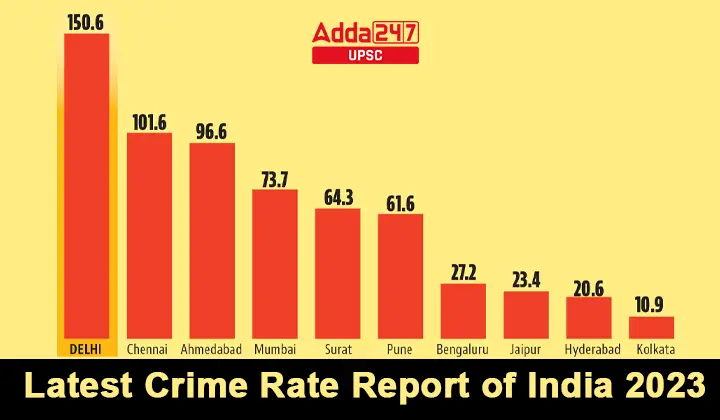
Latest and emerging forms of crime in India
India, with its vast and diverse landscape, is experiencing a paradigm shift in the nature and dynamics of criminal activities. The latest and emerging forms of crime in the country reflect the complex interplay of technological advancements, socio-economic challenges, and evolving cultural dynamics. In this comprehensive exploration, we delve into various facets of crime in India, spanning cybercrimes and digital fraud, social media-related offenses, cryptocurrency-linked activities, human trafficking, environmental crimes, caste-based violence, rising white-collar crimes, and the persistent challenges of drug trafficking and substance abuse.The digital revolution has brought unprecedented connectivity and convenience to the lives of Indians, but it has also paved the way for a surge in cybercrimes and digital fraud. With the growing adoption of digital platforms for financial transactions, communication, and various services, criminals have found new avenues to exploit vulnerabilities. Online fraud, identity theft, hacking, and ransomware attacks have become prevalent, posing significant challenges for individuals. The need for robust cybersecurity measures, public awareness campaigns, and legislative frameworks that keep pace with technological advancements is more pressing than ever.
The ubiquitous presence of social media has given rise to a spectrum of crimes that transcend the boundaries of the virtual and physical worlds. Cyberbullying, online harassment, and the spread of misinformation through social media channels have become pressing issues affecting individuals and communities across the country. The freedom provided by online platforms has emboldened perpetrators, making it challenging for law enforcement to track and prosecute those responsible. Striking a balance between freedom of expression and preventing online crimes requires nuanced legislative approaches and proactive measures to ensure the safety and security of online spaces.
Cryptocurrencies, with their decentralized and pseudonymous nature, have introduced a new frontier for criminal activities in India. Money laundering, tax evasion, and fraudulent investment schemes involving digital currencies have become areas of concern for regulatory bodies. The challenges in regulating and monitoring transactions in the cryptocurrency space underscore the need for adaptive and forward-looking regulatory frameworks that can keep pace with the rapidly evolving financial landscape.
Human trafficking remains a deeply entrenched issue in India, with various forms of exploitation persisting despite efforts to combat this heinous crime. From forced labor in industries with inadequate regulation to sexual exploitation, human trafficking poses a grave threat to the most vulnerable members of society. Addressing this multifaceted problem requires a comprehensive approach that includes legislative reforms, international collaboration, and robust support systems for survivors.
Environmental crimes have emerged as a critical challenge, reflecting the intersection of ecological concerns and criminal activities. Illegal mining, deforestation, and wildlife trafficking are among the offenses that contribute to environmental degradation and threaten biodiversity. Weak regulatory frameworks and enforcement mechanisms provide opportunities for criminal networks to exploit natural resources unlawfully. As India grapples with the imperative of sustainable development, addressing environmental crimes becomes paramount for the well-being of both the planet and its inhabitants.
Caste-based violence continues to manifest as a deep-rooted social issue, resulting in crimes that target marginalized communities. Atrocities against individuals based on their caste identity persist, highlighting the ongoing challenges of social inequality and discrimination. The need for systemic reforms, awareness campaigns, and legal interventions to curb caste-based violence is a pressing concern that requires the collective efforts of civil society, policymakers, and law enforcement.
The corporate sector is not immune to the evolving nature of crime, with white-collar crimes witnessing a rise in sophistication and frequency. Financial fraud, insider trading, and embezzlement pose challenges to the integrity of India’s economic landscape. Regulatory bodies and financial institutions grapple with the complexities of investigating and prosecuting white-collar criminals, highlighting the need for a proactive and adaptive approach to prevent financial misconduct.In the realm of drug trafficking and substance abuse, India faces persistent challenges that impact communities and individuals nationwide. Illicit drug trade and substance abuse contribute to a range of social and economic consequences, from public health crises to the destabilization of communities. Strengthening law enforcement efforts, enhancing rehabilitation programs, and mentioning the main reason of substance abuse are integral components of a comprehensive strategy to combat drug-related crimes.
As the exclusive worldwide law enforcement body boasting a membership of 195 member nations, INTERPOL is strategically situated to observe and analyze transnational crime patterns on both a global and regional scale. Recognizing that the trends outlined in this report may have a global impact, INTERPOL acknowledges the substantial variations in their manifestation across different regions. Unlike regional police organizations concentrating solely on local criminal scenarios, INTERPOL strives to grasp the nuances of global crime trends and their diverse expressions at the regional level.The heightened degree of multilateral collaboration becomes crucial, especially when confronting the covert menace posed by sophisticated organized crime. Such criminal networks, adopting a complex, mafia-style approach, are progressively infiltrating legal economies and undermining state institutions through corruption. INTERPOL’s Project I-CAN facilitates the convergence of stakeholders worldwide to dismantle potent transnational organized crime groups. This initiative harnesses INTERPOL’s capabilities and analytical tools to facilitate the exchange of intelligence and expertise, promoting heightened operational actions.
Technology felicitated Crime:
The advent of the digital age has given rise to an array of technology-facilitated crimes, posing new challenges for law enforcement and individuals alike. Among the latest trends is the surge in ransomware attacks, where cybercriminals encrypt an individual’s or organization’s data and demand payment for its release. Another prevalent form is deepfake crimes, leveraging artificial intelligence to create highly convincing forged audio and video content, raising concerns about misinformation and reputational damage. Phishing scams continue to evolve, exploiting social engineering techniques to trick individuals into divulging sensitive information. As cryptocurrencies gain popularity, crimes involving them, such as fraudulent Initial Coin Offerings (ICOs) and crypto-related fraud, are on the rise. Furthermore, the proliferation of the dark web facilitates illicit activities, including the sale of drugs, weapons, and stolen data. The integration of artificial intelligence in decision-making processes has introduced the risk of biased algorithms, leading to discussions about AI-related crimes and the need for ethical AI development. To combat these emerging threats, there is a growing emphasis on strengthening cybersecurity measures, implementing robust legislation, and fostering digital literacy to empower individuals against these technologically sophisticated forms of crime.
Technology felicitated Crime against Women:
Crime against women using technology, often referred to as cybercrimes or technology-facilitated crimes, has become a growing concern globally, including in India. Various forms of technology-based crimes targeting women have emerged, reflecting the dark side of the digital age. Some notable trends include:
Online Harassment and Cyberbullying:Women frequently face online harassment, including abusive messages, cyberbullying, and threats on social media platforms. Perpetrators exploit the anonymity provided by the internet to intimidate and victimize women, causing emotional distress and sometimes leading to offline consequences.
Revenge Porn and Non-consensual Image Sharing:The unauthorized sharing of intimate images, commonly known as revenge porn, is a grave violation of privacy. Perpetrators may use explicit images or videos to blackmail or shame women, causing significant harm to their personal and professional lives.
Stalking and GPS Tracking:Technology allows for the covert tracking of individuals through GPS-enabled devices or mobile phones. Stalkers may use this information to monitor a woman’s movements, leading to physical or psychological harm.
Phishing and Online Scams:Criminals often use phishing emails, messages, or fake websites to trick women into revealing personal information, such as passwords or financial details. This information can be misused for identity theft, fraud, or harassment.
Online Threats and Trolling:Women in public life, including activists, journalists, or celebrities, often face targeted online threats and trolling. The anonymity of online platforms emboldens individuals to engage in abusive behavior, silencing or intimidating women who express their opinions.
Dating App Crimes:The use of dating apps has given rise to a new set of challenges, with instances of harassment, stalking, and even physical assault reported. Criminals may exploit these platforms to establish contact with unsuspecting women, leading to potentially dangerous situations.
Online Grooming and Sextortion:Perpetrators may engage in online grooming, building trust with women before coercing them into sharing intimate content. This content is then used for sextortion, where victims are blackmailed into providing money or further compromising material.

Mr. Sahil Sharma-Assistant Professor
Forensic Science Department, Geeta University Panipat
Related Posts
Untangling the Knots of Distributed Computing: An Exhaustive Investigation
Introduction In the broad landscape of modern computing, the phrase “distributed computing” has become more than just a buzzword; it is a paradigm that is

Discovering the Marvels of Image and Video Processing While Exploring the Future of Visualization
Discovering the Marvels of Image and Video Processing While Exploring the Future of Visualization In the beginning… Image and video processing have developed into technologies
Unveiling the Power of Segmentation, Targeting, and Positioning in Marketing
Introduction Success in the dynamic field of marketing depends on one’s capacity to recognize and address the wide range of needs of the target audience.


